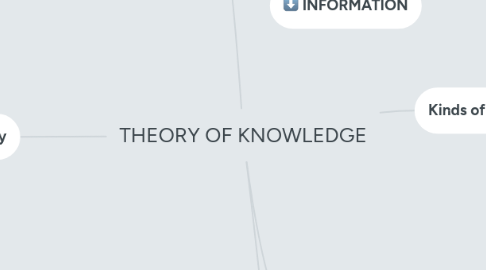
1. Ways of Knowing
1.1. Language
1.2. Sense Perception
1.2.1. Touch
1.2.2. Taste
1.2.3. Sound
1.2.4. Smell
1.2.5. Sight
1.3. Emotion
1.4. Reason
1.5. Imagination
1.6. Faith
1.7. Intuition
1.8. Memory
2. Objectivity & Subjectivity
2.1. Objectivity
2.1.1. logical
2.1.2. factual
2.1.3. universally accepted as true
2.2. Subjectivity
2.2.1. Emotions
2.2.2. Imagination
2.2.3. Understandings of our lives
3. JUSTIFIED TRUE BELIEF
3.1. Tests
3.1.1. Must BELIEVE the statement
3.1.2. Belief has to be TRUE
3.1.2.1. TRUTH
3.1.2.1.1. Public
3.1.2.1.2. Public
3.1.2.1.3. Independent of Anyone's Belief
3.1.2.1.4. Eternal
3.1.2.1.5. ABSOLUTE & RELATIVE TRUTH
3.1.3. Your true belief must be JUSTIFIED
3.1.3.1. Logic
3.1.3.1.1. Rasionalism
3.1.3.2. Empirical evidence
3.1.3.2.1. of our own senses
3.1.3.3. Memory
3.1.3.4. Authority
3.1.3.4.1. can trust them
4. Shared and Personal Knowledge
4.1. Shared Knowledge
4.1.1. We know because...
4.1.2. highly structured
4.1.3. systematic
4.2. Personal Knowledge
4.2.1. I know because...
4.2.2. Skills and Procedural knowledge
4.2.3. through experiences
4.2.4. what I have learned
4.2.5. results of personal academic research
5. Kinds of Knowledge
5.1. Shared and Personal
5.1.1. I/We know how SKILLS (procedural knowledge)
5.1.2. I/We know that... KNOWLEDGE CLAIMS
5.1.3. I/We experience +reflect EXPERIENTIAL KNOWLEDGE
6. TEORIES OF TRUTH
6.1. THE CORRESPONDENCE THEORY
6.1.1. For any proposition (p) p is true if and only if , p corresponds to the facts.
6.1.2. can be proven instantaneously
6.1.3. must have empirical evidence
6.2. THE COHERENCE THEORY
6.2.1. Logic
6.2.2. In agreement
6.2.3. Consistent with the established truth
6.3. THE PRAGMATIC THEORY
6.3.1. by subjective experience
